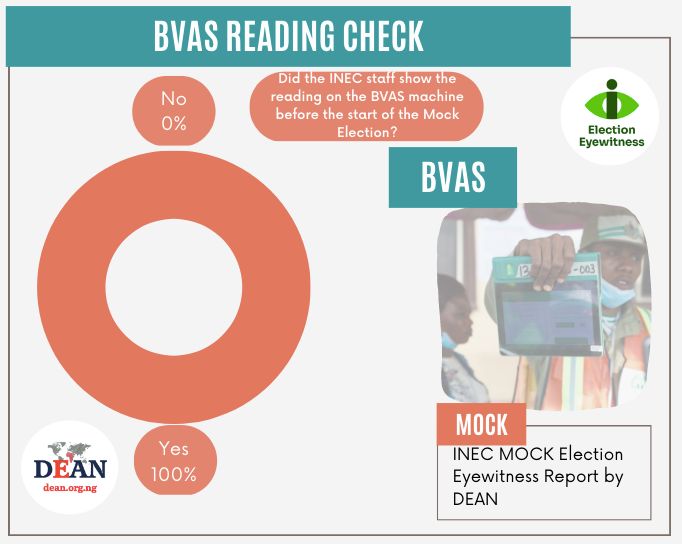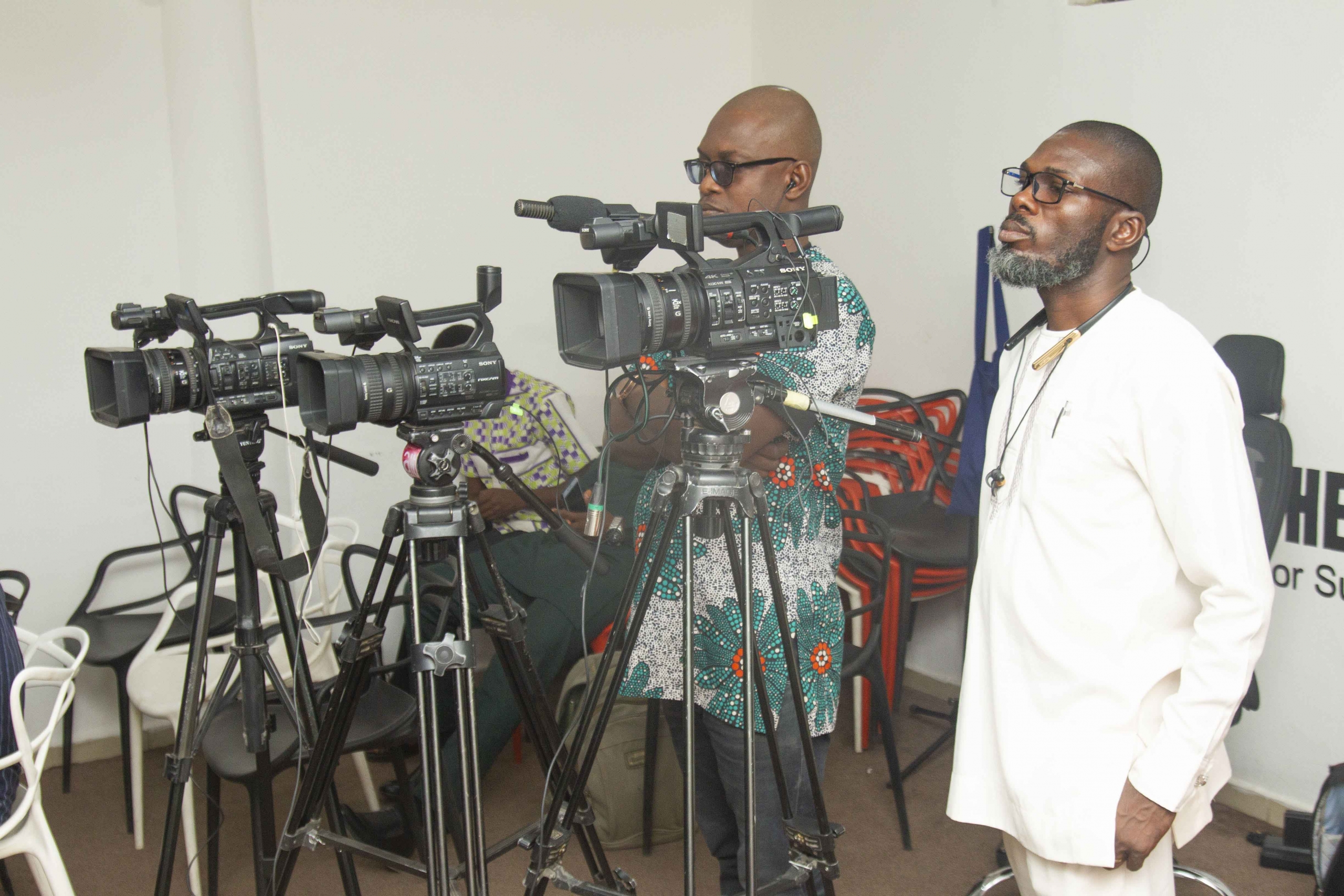Lessons from 2023 INEC’s MOCK Election
50 of our Election Eyewitness Observers were on the field in different states of the country to observe the MOCK Election that was held on the 5 th of February 2023. INEC uses the mock election to demonstrate the entire election procedure to the people. It also provides opportunities to identify potential gaps and technical failures or threats that may hamper the election process and as well enables citizens and other stakeholders to raise genuine concerns ahead of the main elections.
We were specific on our areas of observation interest. The key Observation Area(KOA) was on BVAS efficiency in terms of battery hours, time of accreditation per voter, BVAS reading before the start of the election, and the citizens’ confidence in the BVAS’s performance.
Other Key Areas of Observation(OKAO) include the timely arrival of INEC officials, the average time it takes officials to set up and start attending to voters, voters’ arrival time to polling units, polling units’ accessibility and proximity, preparation for crowd control and management, and security presence and management. Also on the observation lock includes voter turnout, under-age accreditation, and proxy accreditation.
Election Time Management
INEC Staff Set Up Time
 The Election Eyewitnesses on the field generally reported early arrivals of poll officials at most polling units they observed.
The Election Eyewitnesses on the field generally reported early arrivals of poll officials at most polling units they observed.
It takes less than 30 minutes for the poll officials to set up in 92.3% of the PUs observed. This is encouraging against the usual lateness that normally plaque elections especially in remote and suburban centers. The Lateness of officials and longer time for their setups generally affect the election timeline and also provide a way out for hoodlums who take covers in the late night darkness to disrupt vote counting as well as compromised officials who use such a medium to alter results before eventual transmission.
Accreditation Time Per Voter

It was reported to have taken between 2 to 3 minutes to accredit a voter in yet 92.3% of PUs visited by our Election Eyewitnesses. This is a major interest because it has to do with the efficiency of both the BVAS and the handlers. The lesser time it takes to accredit a voter, the better for the time management of the entire election chain of activities.
BVAS Test

The integrity of this election has been largely talked about to depend on the BVAS. The
Election Eyewitnesses reported the display of the initial reading on the BVAS which read:
000 as expected in 100% of PUs visited. The rule provides that before the exercise begins, the
value of reading the BVAS must be shown to the public and it is expected to read: 000.

There were BVAS technical issues in 7.3% of places visited. Battery issues, fingerprint, and
facial recognition issues. In most cases, observers reported that most of the issues were
quickly fixed. But largely, the BVAS functioned maximally in over 90% of places visited.

Voters’ test of confidence in BVAS was investigated and the confidence expressed by the
people goes as high as 95%. This is exciting. This is against concerns expressed in several
quarters that citizens don’t have trust in the ability of the BVAS to facilitate election
integrity. If the process is allowed to run without any form of human manipulation, people
have seen what BVAS can do and how it performed.
Accreditation Dispute

Voters had issues around accreditation in 15% of the PUs observed. A major cause of dispute centered on PU changes without voters’ knowledge. Voters arrive at their original PUs with their PVCs only to discover that they have been reallocated to another PU. The newly created PUs that people were shifted to without their notification may cause more issues at the main election if not rapidly addressed. We also had issues with failed fingerprints and facial recognition. But the availability of the voter register helped resolved most of the issues.
Voters Turnout

Election Eyewitnesses reported 85% poor voter turnout in PUs visited. This is very poor. Observers practically helped look for voters within PU vicinities to come out just to ensure that the exercise achieved the minimum result possible.
Under Age Voting

Election Eyewitnesses reported 0% under-age voting in all PUs observed. The MOCK Election demonstrated what is possible if elections are allowed to hold without any form of negative interest. The different levels of interest that motivate layers of inducements and compromises lead the way in election fraud. Nigeria’s democracy must speedily outgrow the surge of financial affluence and massive wealth accumulation that currently fuels peoples’ passion for democratic service.
Basic Recommendations
- INEC as an institution has time without number assured Nigerians and all stakeholders how ready and committed they are to conduct an election we will all be proud of and we have no doubt seen commendable improvements in their planning and activities. Nevertheless, a good number of INEC field officials have continued to act exhibit a wide range of unethical practices ranging from needless hostility to citizen observers, voters, and good-intentioned stakeholders. These field officials carry with them bags full of aggression, arrogance, and anger that they dispense without control. Elections are citizens’ biggest business to decide their lives in a democratic governed society and to serve as an election umpire is one of life’s greatest honour. This honour must be treated with civility and humanness. We recommend continuous training and retraining of INEC field staff, especially their state and LGA staff members.
- INEC should endeavor to make available all needed resources for field operational activities in this election. Politicians have continued to relish the resource shortages for INEC field officials at the local level and pitching dependable cashflow and logistic for them at prizes that over the years have continued to undermine the integrity of our elections. There is no need to break this down beyond this, at least for now.
- From the Mock exercise, it became obvious that we can have a desired election as a people. We call on INEC to be more intentional in the area of public education and deploy sufficient information to people affected by the new polling unit creation. The new INEC voters’ data contains citizens’ phone numbers and we expect the reason such was collected would be to provide on-the-go information to citizens. It will be unacceptable for eligible voters to miss their right to vote from a situation they had nothing to do with as noticed during the MOCK exercise.
- INEC should also ensure each state is provided with enough BVAS machine backup to promptly replace anyone that may for whatever reason encounter unresolvable technical or human disruption on election day.










 The Election Eyewitnesses on the field generally reported early arrivals of poll officials at most polling units they observed.
The Election Eyewitnesses on the field generally reported early arrivals of poll officials at most polling units they observed. 







